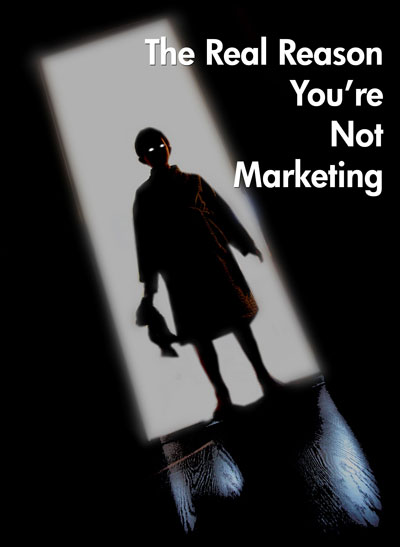How much marketing are you doing, really?
How much “platform building“?
Being honest: probably not that much. Am I right?
If you’re published, you may only send out a newsletter just before a release date. If you’re unpublished, you may blog and then mention it on the three social media accounts you opened… although that’s hit or miss, as well.
Of course, your argument may be: too much is pushy. You don’t want to be sleazy. You certainly don’t want to be one of those asshats that posts something about their book every single day in scheduled bursts.
But that’s not the real reason.
I could make all sorts of arguments why marketing isn’t sleazy. Why it’s useful, even necessary, if you’re going to make any sort of income as a novelist. That marketing is, in fact, more than simply saying “buy my book” — it’s a part of every choice you make in your writing career, and is integral in every element of your stories, whether you’re conscious of it or not.
But I’m not.
If you’re here, I’m going to assume that, at some point, you’d like to make a living with your fiction. So you know marketing is necessary, and we can just go from there.
The real reason you’re not marketing is simple: fear.
Like most fears, it doesn’t matter if it’s rational or irrational: it has power. Enough to stop you in your tracks, if it grows large enough.
What are you afraid of?
Well, the three main ones, in a nutshell, are:
1. That you’ll do it wrong, leading to poor (or no) sales, a ruined brand, and your writing career ending in a big, fiery DOOM.
2. That you’ll be seen as a spammy, pushy, tone-deaf loser and the few readers you do have will leave you, taking your few measly current earnings with them… leading to your writing reputation being ruined, your career utterly failing, and DOOM.
3. That you’ll sell out, turning into a parody of your true self just to make a few bucks, leading to your friends hating you, you hating yourself, career burnout, and ultimately complete failure. And, of course, DOOM.
You may notice a pattern here.
How to address these fears.
We’re going to dip into metaphysics here for a minute. Bear with me.
To change something — a habit, a fear, whatever — takes effort. Havi Brooks of The Fluent Self says there are five levels where change occurs.
- Intellectual
- Physical
- Emotional
- Energetic
- Spiritual
I’m not going to address those last two here, because they’re tricky and not my strong suit to discuss. But change can start and be nudged along at any level, so we’re going to address the first three.
Change on the Intellectual Level.
This is where you use logic. When your subconscious starts to give you reasons why you’re doomed to failure if you try marketing, here are some counter-arguments you can point out:
- If the fear is “you’re going to do it wrong”, remember that you are going to research, use resources and learn, so you’re not marketing completely blind. Beyond that, you’re going to do it wrong — everyone does, at first. It’s an iterative process. Besides, at this level, the danger isn’t ostracism for “being pushy.” It’s obscurity — not being recognized at all.
- If the fear is you’ll be seen as “spammy”, marketing done properly is absolutely not pushy, relentless, or distasteful. Think of marketing you actually appreciate getting. Maybe there’s an author whose social media you follow because she’s entertaining, and you look forward to hearing from her. Maybe you just get a free coffee on your birthday from Starbucks because you have a frequent buyer card. Those are both examples of marketing, and you like them. Ergo, there can be positive marketing… and you can do it, too.
- If you’re afraid you’re turning yourself into a big phony with this “branding” stuff, remind your fear that the most sales you’re going to make will be a result of your authenticity. You have something no other author can offer: your voice, your creativity. (That’s a whole different fear — self-doubt — but you get where I’m going here.)
Change on the Physical Level.
Fear leaves clues.
When you’re afraid, how do you feel? Do your shoulders tense? Do you take short, shallow breaths? Does your heart pound? Maybe your stomach knots? Do you have muscle aches? Or maybe just a wave of fatigue?
Addressing physical aspects can address the psychological ones, as well. Think of it as reverse engineering — you’re addressing symptoms as a way to work towards the underlying problem.
The first and easiest solution for this: mindful breathing. Yup, just regulated deep breathing will take the edge off the worst of your fear, allowing you to work on another level because you get an edge on it.
Likewise, taking a hot bath or shower (for muscle aches and tension), drinking a big glass of water or possibly mint tea (stomach issues), or getting more sleep will also give you an advantage over your fear symptoms. If you can afford it, getting a massage will help your physical, mental, and emotional states.
Change on the Emotional Level.
Again, rational or not, fear is fear. Sometimes, the logical arguments don’t work. Simply saying to yourself “but I shouldn’t be afraid” is just creating more anxiety, and adding a heaping side of guilt, as well.
The key to emotional change, then, is acceptance.
Recognize exactly what you’re afraid of, and then own it. You can do that by saying to yourself (out loud, if need be): “I’m afraid of (whatever it is), and that’s okay. I may not like that I’m afraid of it, but right now, that’s all right. This is just the situation I’m in. I’m allowed to be afraid. Just because I’m afraid now doesn’t mean I will be forever. Even though I hate feeling guilty about being stuck in this, this is where I am.”
Strangely, just acknowledging what’s going on without judgment is enough to, again, give you that edge — something to work on, a way to start climbing out of the pit of inertia and fear.
Action is the game changer.
Naomi Dunsford has this great analogy about fear. She says it’s a monster that feeds on your inaction and paralysis. The less you do, the more it bullies you — and the more it feeds, making it grow larger, with an even bigger voice.
You don’t want to kill it, because it’s a part of you. But you do want to shrink it.
How? By taking tiny actions, every day, and moving forward. The more actions you do, the smaller the monster becomes.
Small actions beget bigger ones. It doesn’t even matter if you have a plan to start. You’ve got a vague idea of what you should be doing. Take one small step, and then another. Build the fire of your momentum, one twig at a time.
Fear is the foundation of courage.
You’re always going to have fears. That’s okay. Courage isn’t the absence of fear. (As they say, the absence of fear is insanity!)
But you don’t have to let it stop you, either. Marketing, writing — any goal you might have — will have fears attached.
Learn how to manage your fear, and you’ll find yourself marketing more effectively, and more regularly. More than that, you’ll find yourself moving closer to your dreams in all areas. It’s a skill worth learning.
To increase your odds of marketing more effectively, you might also try my new ebook — Painless Promotion: Strategy. I wrote it to help authors simplify their choices and come up with a big picture plan, instead of panicking that they’re not doing enough.
(See? See what I did there? Marketing. <g>)

